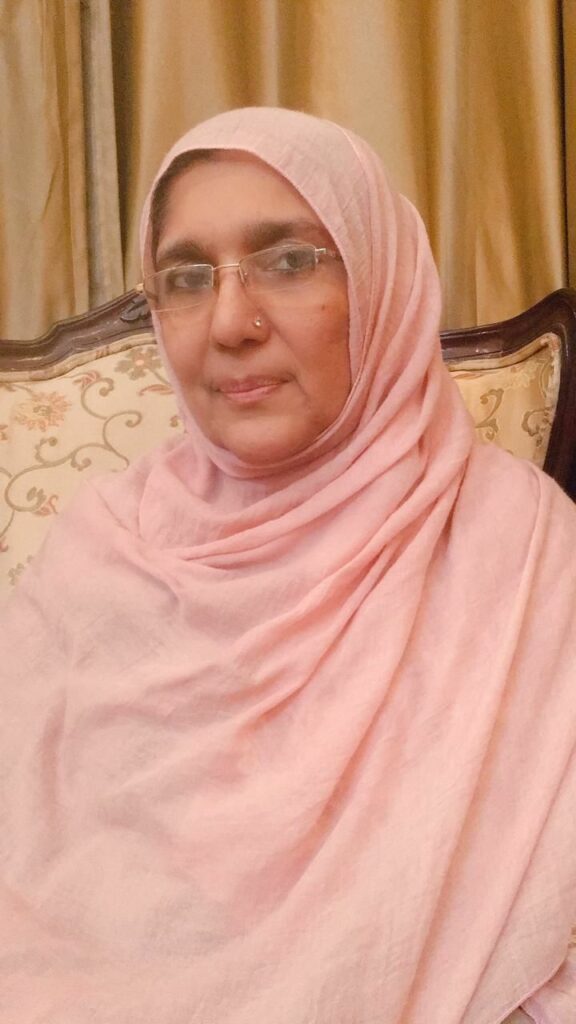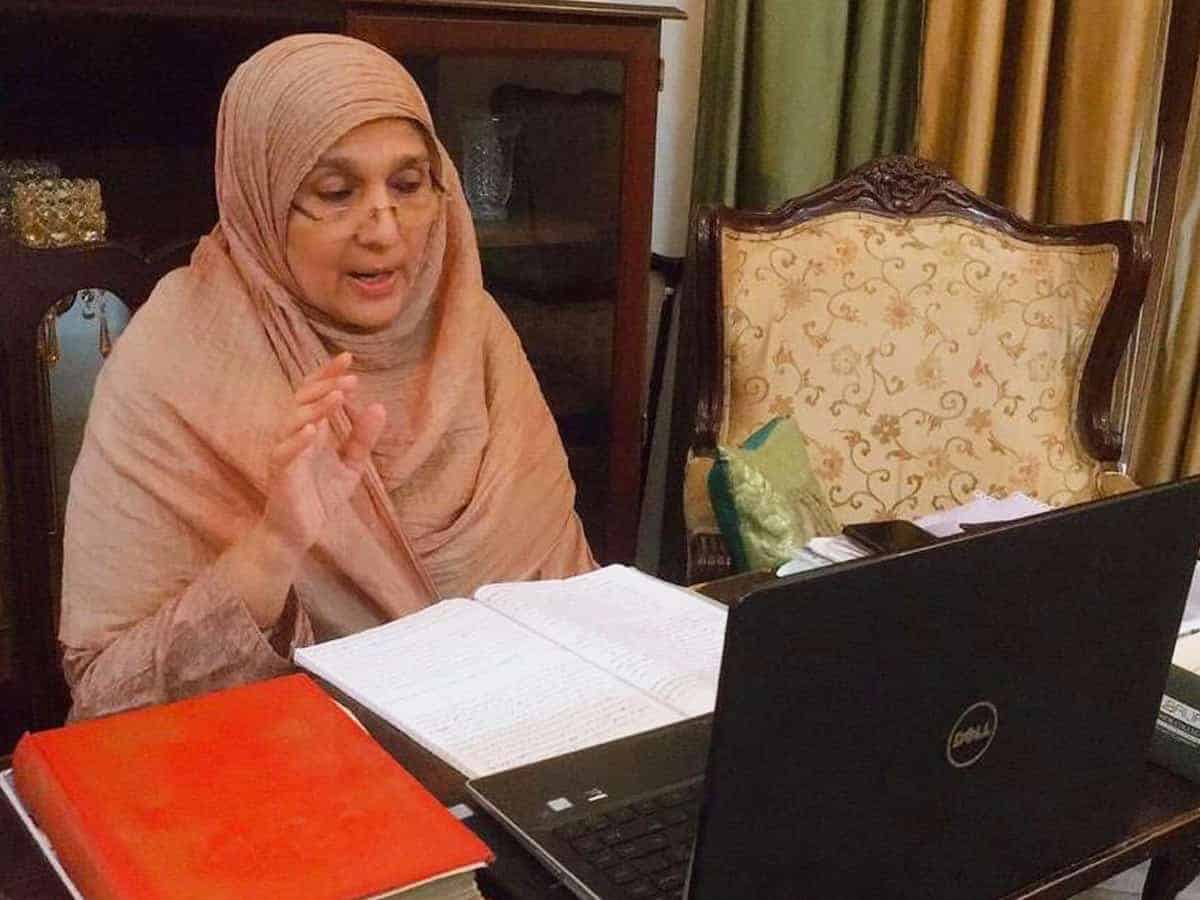Syed Hurairah
Hyderabad: What does the grammar of Arabic of the Quran, etiquette, good conduct, the seerah of the Prophet Muhammad and exegesis of the Holy Book, technology and the lockdown have in common? Everything.
Ever since the outbreak of the COVID – 19 pandemic, thrice a week, Arabic grammarian and author of the book Learning Arabic – The Language of the Quran, Izzath Uroosa has been delivering lectures on the aforementioned topics. With an aim to disseminate information about the immeasurable wisdom of the Quran, and the lessons from the life of the Prophet Muhammad (SAWS).
“The idea was to make the most of the lockdown by studying and sharing knowledge of the Quran, and the seerah (life history of the Prophet). There are innumerable lessons contained in the Quran and Hadith. For instance, transgressions against others is a strict no-no. The case is the same with slander, which is a big sin. A lot of us deliberately or inadvertently indulge in slander which is strictly prohibited. We first began with the tafsir (exegesis) of the last few surahs (chapters) of the Quran and then moved towards studying the seerah,” Ms Uroosa says.

Lectures and discussions are over Zoom and are scheduled at 3 pm every Monday, Thursday and Saturday. Participants are from all walks of life – students, homemakers, those engaged in business and professionals. The highest number of attendees were in the holy month of Ramzan.
Ms Uroosa speaks of what ignited her interest in Arabic. The life as an expatriate in Saudi Arabia opened the doors of opportunity. While her husband worked to provide well for the family, she began to study the Quran. It was here that she first felt the thirst for knowledge of the holy Book. But more than two decades later, this thirst for knowledge is far from being satiated. “For many years I studied under a teacher, a seasoned Arabic grammarian. Taking a note of my interest, she taught me several chapters connected to grammar in a short period of time. To share whatever I know is my duty,” she says.
Ms Uroosa says that Quran and the Sunnah of the Prophet Muhammad (SAWS) contain all the wisdom that is required for a person to be a good human being. For instance, the Prophet is reported to have said that he has been sent to bring about the prevalence of good etiquette.
“The Prophet (SAWS) has also said that those who have imaan (faith) in Allah and the Day of Resurrection, they should speak good, otherwise stay silent. Surah Baqarah says that speak the best to people. So what does this mean? It means that there should be kindness, tenderness, dignity and patience in speech. Conversations should not be without reason. They should not be embarrassing, humiliating, degrading. Speech should be clear. The Quran and Sunnah say this very clearly,” she explains.
Another important subject the Quran deals with is the concept and dispensation of justice. “Justice is an important aspect of faith. It is underscored that zulm, meaning injustice or oppression, should be stopped,” Ms Uroosa, who did her MA in Arabic from the Centre for English and Foreign Languages (now English and Foreign Languages University), under the tutelage of Maulana Rashid Naseem Nadwi and others, says.
But, studying Arabic was no easy task. A mother of then two young children, and an entrepreneur running a boutique in Banjara Hills, specialising in traditional bridal wear and later expanding the range, she had to do quite a bit of juggling and multi-tasking. On the one hand, she did not want put her Arabic education on the backburner. And on the other, she could not let family play second fiddle. In no mood to compromise, she sought the help of classmates, Arabic scholars and others who could help her to understand the language of the Quran. The culmination was the book which she laboured for years – Learning Arabic–The Language of the Quran. It is the outcome of two decades of teaching and many more years of learning.
“The tafsir teaches us many things such as the rights of neighbours, of relatives, of wives over husbands and husbands over wives, tawakkul, and faith in Allah, among many other things. I try to correlate what is mentioned in the Quran with what is happening in the present-day. This gives context and makes it easier to understand. After each lecture, there is a short question and answer session,” she says.
On Saturday, the lecture was about one of the most significant chronology of events in Islamic history and also theology: the Ashura. She narrates the incidents of the Battle of Siffeen and the Battle of Jamal. Of how the people of Kufa swore allegiance to Hazrat Imam Hasan, while those of Syria swore allegiance to Ameer Muawiyah; of how in an act of fortitude, and also to prevent further bloodshed, Hazrat Imam Hasan relinquished his khilafat which lasted six months. She narrates a hadith of the Prophet SAWS, that righteous khilafat would last a total of 30 years, the last six months of this was the tenure of Hazrat Imam Hasan.
“After the death of Ameer Muawiyah, his son Yazid succeeded him. After this, the people of Kufa invited Hazrat Imam Hussain, and wanted him to be the Khalifa, as they were against the Umaiyyads. When Hazrat Imam Hussain reached Karbala, Yazid’s army of 4,000 intercepted him and his companions and on 10th of Muharram, in the most cruel and barbaric way, martyred Hazrat Imam Hussain who was none other than Prophet Muhammad’s grandson. This martyrdom cannot be forgotten,” Ms Uroosa says.
The history of Islam and the lives of the Prophet, his family and companions form the bedrock of the faith of the Muslims. What Ms Uroosa tries is to revisit these chapters of Islam and its history in an interesting manner to make even the people with little knowledge feel confident of the understanding they gain. Therefore, it is unsurprising that more women and girls from far off places in Hyderabad, India and even other countries are joining her Zoom classes.

